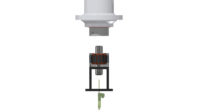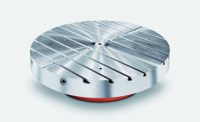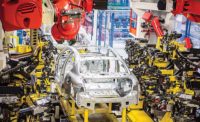Two of the biggest trends in the auto industry today are flexible production systems and electric power. And while at first glance they may seem to have little in common, the truth is that the underlying technologies needed to implement both are, in many cases, identical.
The key to success in both cases will be the application of intelligent manufacturing and assembly systems across the entire production process. The shape of that solution is already beginning to emerge in the world’s most advanced battery manufacturing facilities where intelligent assembly systems are enabling unprecedented levels of quality and productivity.
How-To Make “Perfect” Batteries
Lithium Ion batteries are the technology of choice for virtually all electric vehicles being produced today. Their production requires extremely precise control of an operation that presses powdered electrolyte in place on both sides of a metallic collector plate. The thickness and density of the electrolyte on each side of the collector must be as close to identical as possible to maximize battery capacity and service life.
The precision, feedback and verification required in applications like this make fully electric servo press technology the right choice. My company, Promess, has been involved in a number of battery projects in which Electro-Mechanical Assembly Presses (EMAPs) with built-in force and positioning control technologies have replaced hydraulic press systems in both electrolyte pressing and subsequent assembly operations.
The EMAP is essentially a CNC press consisting of a ball-screw driven by a servomotor and equipped with an array of sensors to measure position, force, and any number of other process parameters. In what is rapidly emerging as a standard solution for automotive batteries, a pair of EMAPs equipped with integral force and position measuring instrumentation press a pair of electrolyte-filled die plates together simultaneously. The operation is managed by a Promess UltraPRO multi-axis controller that precisely synchronizes the motion of the EMAPs and monitors the amount of force being applied.
Once the specified force and location parameters are achieved the system holds that force level for a programmed time to allow the electrolyte to solidify. All of the data is stored to provide 100 percent traceability for every battery.
How-To Destroy “Perfect” Batteries (On Purpose)
Automotive propulsion batteries use highly reactive chemicals to store large amounts of energy that makes crashworthiness a critical design criteria. The only practical way to validate the design decisions built into those batteries is to test them to destruction under precisely controlled conditions that reliably produce results that mirror real-world data from actual crashes.
Here again, the solution is a programmable intelligent system. One major automaker is using fully-instrumented EMAPs to perform both puncture and crush testing on their batteries. The presses crush and/or drive penetrators through the batteries to simulate damage to batteries recovered from crashed vehicles. The data generated in these tests is used to develop even better protective packaging for the next generation of electric vehicles.
How-To Build Better Motors
Better powered vehicles depend on better motors to deliver the drivetrain efficiency electric vehicles will need to be competitive with conventional vehicles. This is another area where intelligent assembly systems are helping automakers meet the goal.
EMAPs, for example, are being used to assemble high-efficiency wheel drive motors at several automakers. The sophisticated system presses steel core stators and bearings onto a rotor hub in a single operation monitored and controlled with integral force and position sensors. All component positions are measured and recorded in real-time to ensure quality and provide 100 percent traceability for every assembly.
The Road Ahead
Batteries are going to be more power-dense, motors are going to be more efficient and the systems used to manufacture them are going to be more flexible. Those trends are solidly established and unlikely to change anytime soon – and they will all be the product of intelligent systems. You can take that to the bank.
Promess
11429 Grand River Road
Brighton, MI 48116
(810) 229-9334





